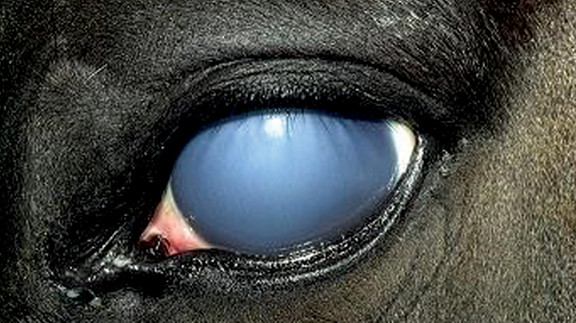Equine Cataracts
What are they?
Cataracts are anything that stops light passing through a horse's lens in their eye – we examine horses for cataracts frequently, and an eye examination is always included in pre-purchase examinations (vettings).
They can be congenital (present at birth) or progressive (continue to get larger) however some will never cause your horse a problem.
The centre of the lens forms before birth, however the lens continues to develop throughout life as layers of cells stretch around the eye laying down fibres. The cells that make up the lens are permanent – and any damage to them or inflammation within the eye can cause them to lose their transparency and start blocking light entering the eye.
What can cause cataracts?
First there are some cataracts that affect the central part of the lens called the nucleus. This is the part that is present from birth.
Trauma that damages the blood/nutrition supply to the lens, for example if the lens is displaced, will always result in formation of a cataract.
Inflammation of the eye can have a similar effect.
Where cataracts are causing a progressive loss of sight, the signs can include:
stumbling on uneven ground
walking into objects
frequent facial injuries
change in head carriage
shying
increased anxiety
What can be done to treat cataracts?
Once they have formed they are permanent – so no medical management will remove cataracts. Treatment of the eye may be required to reduce further damage in inflamed or infected eyes, but this will not remove the cataract itself.
Small cataracts or cataracts which are on the periphery of the lens often do not affect vision of the horse, so monitoring the eye over the horses life may be all that is required.
Horses cope well without vision in one eye – especially if the vision worsens gradually and they can adapt. We often see horses with limited vision in one eye, or after having had an eye removed returning to ridden work – in fact I owned a pony with no vision in one eye when I was young and in pony club!
Large cataracts that affect vision can be removed using surgery, in a horse this is performed under general anaesthesia. The lens is gradually removed through an incision – allowing light to enter the eye again, lens replacement with an implant is not currently performed in horses. This at present gives the horse vision, with around 60% still having vision in the eye after 4 years, and costs around £3000 per eye.
We are very careful if we suspect your horse could have anything that could affect the vision in an eye - we will therefore recommend that they are seen the same day if they have any injury to the eye or signs of ocular pain, so we can get your horse started on careful treatment and monitoring as soon as possible.
Adam (May 2018)

